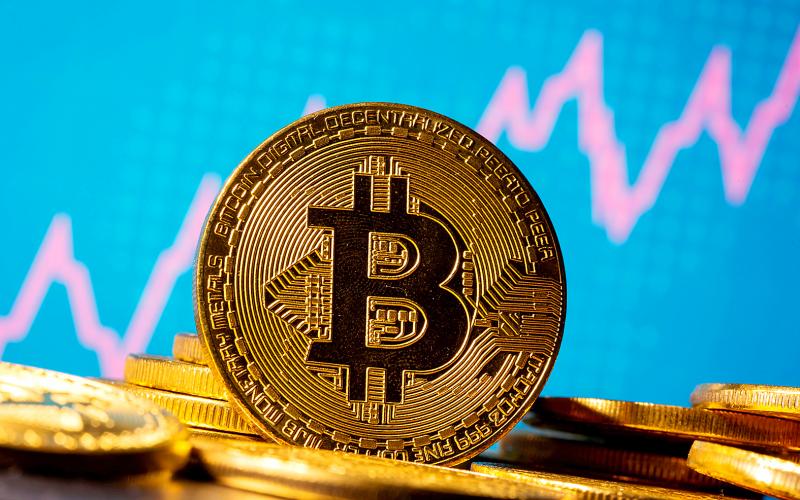Bitcoin, the world’s largest cryptocurrency, topped US$34,000, just weeks after passing another major milestone.
The currency gained as much as 7.8 percent to US$34,182.75, before slipping to about US$33,970 as of 3:05pm yesterday in Singapore. It advanced almost 50 percent last month, when it breached US$20,000 for the first time.
The latest gains top an eye-popping rally for the controversial digital asset, which rebounded sharply after a severe crash in March last year that saw it lose 25 percent amid the COVID-19 pandemic.

Photo: Reuters
The currency “will be on the road to US$50,000 probably in the first quarter of 2021,” said Antoni Trenchev, managing partner and cofounder of Nexo in London, which bills itself as the world’s biggest cryptocurrency lender.
Institutional investors returning to their desks this week will likely boost prices further after retail buying over the holidays, he said.
Bitcoin has increasingly been “embraced in more global investment portfolios as holders expand beyond tech geeks and speculators,” Bloomberg Intelligence commodity strategist Mike McGlone wrote in a note last month.
Proponents of the currency have also seized on the narrative that the coin could act as a store of wealth amid supposed rampant money printing by central banks, even as inflation remains mostly muted.
Bitcoin should eventually climb to about US$400,000, Guggenheim Investments chief investment officer Scott Minerd told Bloomberg Television in an interview on Dec. 16 last year.
Still, there are reasons to be cautious, partly because cryptocurrencies remains a thinly traded market.
Bitcoin slumped as much as 14 percent on Nov. 26 amid warnings that the asset class was overdue for a correction. A big run-up in price in 2017 was followed by an 83 percent rout that lasted a year.

MULTIFACETED: A task force has analyzed possible scenarios and created responses to assist domestic industries in dealing with US tariffs, the economics minister said The Executive Yuan is tomorrow to announce countermeasures to US President Donald Trump’s planned reciprocal tariffs, although the details of the plan would not be made public until Monday next week, Minister of Economic Affairs J.W. Kuo (郭智輝) said yesterday. The Cabinet established an economic and trade task force in November last year to deal with US trade and tariff related issues, Kuo told reporters outside the legislature in Taipei. The task force has been analyzing and evaluating all kinds of scenarios to identify suitable responses and determine how best to assist domestic industries in managing the effects of Trump’s tariffs, he

TIGHT-LIPPED: UMC said it had no merger plans at the moment, after Nikkei Asia reported that the firm and GlobalFoundries were considering restarting merger talks United Microelectronics Corp (UMC, 聯電), the world’s No. 4 contract chipmaker, yesterday launched a new US$5 billion 12-inch chip factory in Singapore as part of its latest effort to diversify its manufacturing footprint amid growing geopolitical risks. The new factory, adjacent to UMC’s existing Singapore fab in the Pasir Res Wafer Fab Park, is scheduled to enter volume production next year, utilizing mature 22-nanometer and 28-nanometer process technologies, UMC said in a statement. The company plans to invest US$5 billion during the first phase of the new fab, which would have an installed capacity of 30,000 12-inch wafers per month, it said. The

Taiwan’s official purchasing managers’ index (PMI) last month rose 0.2 percentage points to 54.2, in a second consecutive month of expansion, thanks to front-loading demand intended to avoid potential US tariff hikes, the Chung-Hua Institution for Economic Research (CIER, 中華經濟研究院) said yesterday. While short-term demand appeared robust, uncertainties rose due to US President Donald Trump’s unpredictable trade policy, CIER president Lien Hsien-ming (連賢明) told a news conference in Taipei. Taiwan’s economy this year would be characterized by high-level fluctuations and the volatility would be wilder than most expect, Lien said Demand for electronics, particularly semiconductors, continues to benefit from US technology giants’ effort

‘SWASTICAR’: Tesla CEO Elon Musk’s close association with Donald Trump has prompted opponents to brand him a ‘Nazi’ and resulted in a dramatic drop in sales Demonstrators descended on Tesla Inc dealerships across the US, and in Europe and Canada on Saturday to protest company chief Elon Musk, who has amassed extraordinary power as a top adviser to US President Donald Trump. Waving signs with messages such as “Musk is stealing our money” and “Reclaim our country,” the protests largely took place peacefully following fiery episodes of vandalism on Tesla vehicles, dealerships and other facilities in recent weeks that US officials have denounced as terrorism. Hundreds rallied on Saturday outside the Tesla dealership in Manhattan. Some blasted Musk, the world’s richest man, while others demanded the shuttering of his